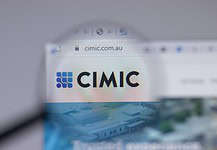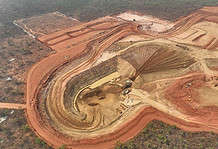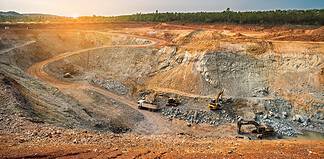Decmil: diversifying to meet new demand
SERVICE providers across Australia are re-evaluating their business strategies as traditional sources of income in iron ore and LNG continue to slide.
According to project delivery major Decmil, companies that diversify, both geographically and across different market sectors, stand the best chance of withstanding tough conditions.
Decmil’s half year results, released in early February, demonstrated how challenging current conditions are, as well as the benefits of active strategy adjustment.
The company reported a 48 per cent increase in revenue to $389.8 million for the six months ended 31 December 2014 – although lower construction margins saw earnings before interest, taxes, depreciation, and amortisation and net profit after tax decline by 7.4 per cent and 4.9 per cent, respectively.
Decmil chief executive Scott Criddle said the company was increasingly leveraged towards governmental spending, with the public sector now comprising about half of its project load.
“We expect to continue to see challenges for contractors in the natural resources sector with margins reducing following the construction boom of recent years,” he said.
“Decmil has continued to evolve its client base and capabilities and will seek construction and engineering work in new markets where there is opportunity. The group has made strides as a significant contractor to government on infrastructure projects such as roads and bridges, as well as education, health and defence facilities.”
Adapting to new markets
Established in Karratha in 1979, Decmil built its base on construction services for WA’s expanding iron ore industry. The group entered the LNG market in 1980 after gaining contract rights to a developing Woodside LNG project, consolidating its business strategy in Pilbara-based natural resources.
With the growth of Australia’s resources sector last decade, the company further diversified its range of services to include design, engineering, construction, mechanical fabrication, maintenance and accommodation services. It also expanded its delivery range to meet client needs in regional and remote Australia – particularly in WA, the Northern Territory and Queensland.
“In 2000, there was talk in Karratha for the start of the commitment of resources in WA, with heavy investment in oil and gas and iron ore,” Mr Criddle said.
“We were lucky enough to be positioned to access all that capital spending in the last 15 years. We did a lot of work with Rio, Woodside, BHP, FMG, Chevron in WA, as well as more recently, over east; we’ve particularly been working with QCLNG and Santos in Queensland.”
However, Decmil has been forced to further diversify in the last five years, becoming increasingly active in public sector projects to supplement falling resources-based projects.
“It’s terrible out there from a work-winning perspective. It’s hard to win any new project because resources companies aren’t launching any new projects,” Mr Criddle said.
“There’s a structural change happening, and the amount clients spend on new projects now is just not there. Clients are just consolidating projects because they’ve got no more [capital expenditure]; for them it’s just about getting their production costs down as cheap as possible.”
Decmil was contracted by the Federal Government’s Department of Immigration and Border Protection (DIBP) to deliver a new offshore processing centre for asylum seekers on Manus Island, Papua New Guinea.
The $253 million project, scheduled for completion in the coming months, included new accommodation blocks, central dining facilities, and health and welfare facilities. Decmil also secured secondary contracts for additional operational fixtures, including warehousing and storage, road repairs, and water and sewerage treatment plants repairs.
“Logistically, it’s a challenging project, and a lot of planning had to go into it, but it’s been a good project; it’s gone to plan and we’ve worked to keep customers and governments happy with the outcome,” Mr Criddle said.
Resources projects
Decmil has provided ongoing services to the construction of Roy Hill; one of Australia’s last major iron ore developmental projects to date. In April 2013, it was awarded two contracts worth $71.5 million for the design and construction of rail and port facilities, and later that year, gained another $37.5 million contract to design the project’s diesel infrastructure – including rail and mine fuel yards, a go-line fuel facility, and fuel for mine services and rail wet commissioning facilities.
Earlier this year, Decmil signed a $40 million extension contract to oversee structural mechanical and underground services at the site.
Mr Criddle said the latest project, to be completed on behalf of Roy Hill and its partner company Samsung C&T, would finish in time for the mine’s scheduled opening in September.
In January 2015, the company announced its wholly-owned subsidiary Eastcoast Development Engineering had won a contract extension with QGC, for wellsite installation at QCLNG Upstream project.
The contract, worth about $65 million, included many major services to move the project from development into operations, including supporting QGC with wellhead construction, logistics, material management and a range of construction requirements.
Future outlook
Mr Criddle said the company’s focus into the future would be three-sided – primarily focused on Australia’s resources sector, followed by Australian government projects and international resources projects.
“We’ll be focussing on our core market around oil and gas and mining because they are our core markets still – although, we have a realisation that they’re not going to be providing the revenues we used to get,” he said.
“The second thing is to focus a lot more on our government exposure in their projects.
“Third, into the future, is to look at more and more work overseas. We aim to progressively head in to PNG and New Zealand, Indonesia and East Timor. We follow our customers from Australia to their project destinations overseas; they know who we are and what we do, and we are able to create a relevant strategy for them to follow.”
Mr Criddle emphasised, however, that the construction industry in general was facing a challenging period into the medium term.
“It’s going to be really challenging, and we’re going to have to work really hard, in the organisation as a team,” he said.
“But if our strategies are right, and the culture in the business is right, we should be able to get ourselves through the next two or three years, and come out the other side quite a strong business.”







































